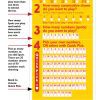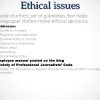Do you ever wonder if you need a gambling license for bingo? Well, you’re in the right place to find out! Bingo is a fun and exciting game that many people enjoy playing, but when it comes to organizing a bingo event, there are some legal considerations to keep in mind.
Now, you might be thinking, “Why do I need a gambling license for a simple game like bingo?” It’s a valid question, and in this article, we’ll explore the regulations and requirements surrounding bingo and gambling licenses. So, whether you’re planning a charity bingo night or just curious about the rules, let’s dive in and uncover the facts!
Running a bingo game and wondering if you need a gambling license? The answer depends on where you are and the specifics of your bingo game. In many countries, including the US and UK, bingo is considered a form of gambling and requires a license. However, there are exceptions for small-scale, non-commercial games or games held for charity. It’s important to check your local regulations to ensure compliance. Remember, this information is for informational purposes only and is not legal advice.

Do You Need a Gambling License for Bingo?
When it comes to organizing a bingo game, many people wonder whether a gambling license is required. The answer to this question can vary depending on the specific jurisdiction and regulations in place. In this article, we will explore the topic in detail to help you understand whether or not you need a gambling license for bingo.
Overview of Bingo and Gambling Licenses
Bingo is a popular game that involves players marking off numbers on a card as they are called out. It is often played for prizes or money. On the other hand, a gambling license is an official authorization that allows an individual or organization to offer and operate gambling activities. Gambling licenses are typically issued by governmental or regulatory bodies.
In some cases, the requirement for a gambling license for bingo will depend on the type of bingo game being conducted. For example, if the game is purely for fun and involves no cash prizes, a gambling license may not be necessary. However, if the game involves cash prizes or is being run as a commercial venture, a gambling license may be required.
It is important to note that laws and regulations surrounding gambling and bingo can vary greatly between jurisdictions. It is crucial to consult the specific laws and licensing requirements of your location to ensure compliance.
The Need for a Gambling License
In many jurisdictions, operating a bingo game with cash prizes or profits requires a gambling license. The reasoning behind this requirement is to ensure that the game is conducted fairly, transparently, and within the bounds of the law.
Obtaining a gambling license typically involves submitting an application to the relevant regulatory authority and meeting certain criteria. These criteria can include demonstrating the financial stability of the organization, providing information about the individuals involved in operating the game, and outlining the security measures that will be implemented.
By obtaining a gambling license, you not only ensure that you are operating within the law but also gain credibility and trust from participants. A gambling license can provide reassurance that the game is being conducted in a legitimate and regulated manner, protecting the interests of all involved.
Exemptions and Exceptions
While a gambling license may be required in many cases, there are exemptions and exceptions that vary depending on the jurisdiction. For instance, some jurisdictions may have specific regulations in place for charitable or nonprofit organizations. These organizations may be allowed to host bingo games without obtaining a gambling license, provided that the proceeds are used for charitable purposes.
Furthermore, some jurisdictions may have different regulations for small-scale, private bingo games held among friends or family members. These games may fall under the category of social gambling and may be exempt from requiring a gambling license.
It is essential to research and understand the specific laws and regulations in your jurisdiction to determine whether your bingo game qualifies for any exemptions or falls under any exceptions that may exempt you from needing a gambling license.
Benefits of Obtaining a Gambling License
While the process of obtaining a gambling license may require effort and resources, there are several benefits to consider:
- Legality and Compliance: By obtaining a gambling license, you ensure that your bingo game is conducted legally and in compliance with the relevant regulations and laws of your jurisdiction.
- Credibility and Trust: Holding a gambling license can instill confidence and trust in the participants of your bingo game. It shows that the game is being operated transparently and within the parameters set by the regulatory authority.
- Protection against Legal Issues: Operating a bingo game without the required gambling license can lead to legal consequences and potential fines. By obtaining a license, you protect yourself and your organization from legal complications.
- Potential for Growth: Obtaining a gambling license opens up opportunities for growth and expansion. It allows you to host larger games, offer higher cash prizes, and attract a wider audience.
Tips for Obtaining a Gambling License
If you have determined that you need a gambling license for your bingo game, here are some tips to navigate the licensing process:
- Research Requirements: Familiarize yourself with the specific requirements for obtaining a gambling license in your jurisdiction. Each location may have different criteria and application processes.
- Compile Documentation: Gather all the necessary documents and information required for the application. This may include financial records, personal information of individuals involved, and security plans.
- Seek Professional Assistance: If the licensing process seems overwhelming, consider seeking assistance from professionals who specialize in gambling licensing. They can guide you through the process and ensure all necessary steps are taken.
Additional Information
Understanding Gambling Regulations
When it comes to gambling regulations, it is important to understand the legal framework that governs the activity. This section will provide a comprehensive overview of gambling regulations and their implications for bingo games.
The Role of Gaming Commissions
Gaming commissions play a crucial role in overseeing and regulating the gambling industry. Learn more about the functions and responsibilities of gaming commissions when it comes to bingo games.
Comparing Gambling Licenses for Different Games
While this article focuses on gambling licenses for bingo games, it is insightful to compare the licensing requirements for other popular gambling activities. Explore the differences and similarities in licensing for various games.
Benefits of Bingo Licensing
Delve deeper into the benefits of obtaining a gambling license specifically for conducting bingo games. Learn how a license can enhance player experience and ensure fair play.
The Process of Obtaining a Bingo License
Gain a comprehensive understanding of the step-by-step process involved in obtaining a gambling license specifically for conducting bingo games. This section will provide practical guidance for aspiring organizers.
Case Studies: Successful Bingo Licensing
Learn from real-life success stories of individuals and organizations that have successfully obtained gambling licenses for their bingo games. Discover the strategies and best practices that led to their licensing success.
Tips for Running a Licensed Bingo Game
After obtaining a gambling license for your bingo game, it is important to ensure the smooth operation of the game. This section will provide tips and advice on running a licensed bingo game effectively.
Conclusion
Understanding the requirements for a gambling license when hosting a bingo game is essential to ensure compliance with the law and maintain the trust of participants. While the need for a gambling license may vary depending on the jurisdiction and nature of the game, it is always advisable to research and understand the specific laws and regulations applicable in your location.
If a gambling license is required, it is important to go through the necessary steps to obtain one. The benefits of holding a gambling license, such as legality, credibility, and potential for growth, outweigh the effort involved in the licensing process. By following the tips provided and seeking professional assistance if needed, you can navigate the licensing process successfully and enjoy the benefits of operating a licensed bingo game.
Key Takeaways:
- A gambling license is typically required to host a bingo event.
- The specific regulations and requirements for obtaining a gambling license vary by jurisdiction.
- Some jurisdictions may offer specific licenses for bingo, while others may include it under a general gambling license.
- Obtaining a gambling license involves completing an application process and paying the necessary fees.
- Operating a bingo event without a proper license can result in legal consequences.
Frequently Asked Questions
Do you have questions about obtaining a gambling license for hosting bingo events? Look no further! We’ve got you covered with answers to some commonly asked questions.
1. What are the requirements for obtaining a gambling license for bingo?
Obtaining a gambling license for bingo usually involves a few key requirements. Firstly, you’ll need to be of legal age to apply for a license. Additionally, you may need to provide information about the event, such as the venue, date, and expected attendance numbers. It’s also important to have a clear understanding of your local gambling laws and regulations, as they can vary from one jurisdiction to another.
To apply for a gambling license, you will typically need to complete an application form provided by the relevant regulatory body. This form may require details about the organizers, their background, and any previous experience in hosting similar events. Additionally, you may be required to pay a fee to cover the costs associated with processing the license application.
2. Can I host a small-scale bingo event without a gambling license?
It’s always best to check the specific laws and regulations in your area, but in many cases, small-scale bingo events may not require a gambling license. Typically, these events are informal, with low stakes, and any proceeds are often used for charitable purposes. However, it’s important to note that the rules can vary, so it’s a good idea to consult with a legal professional or the local gambling regulatory body to ensure you are operating within the law.
Keep in mind that even if a gambling license is not required, you may still need to comply with certain rules and regulations. For example, you may need to adhere to restrictions on prize values, advertise responsibly, and ensure that participants are of legal age to play.
3. How long does it take to obtain a gambling license for bingo?
The time it takes to obtain a gambling license for bingo can vary depending on several factors. These factors may include the jurisdiction you are applying in, the completeness of your application, and the workload of the regulatory body. In some cases, the process can be completed within a few weeks, while in others, it may take several months.
To ensure a smooth and timely application process, it’s important to carefully review the requirements and guidelines provided by the regulatory body. This will help you gather all the necessary documentation and information required to submit a complete and accurate application. If you have any questions or need assistance, don’t hesitate to reach out to the regulatory body for guidance.
4. Can I transfer a gambling license for bingo from one person or organization to another?
In most cases, gambling licenses for bingo are not transferable from one person or organization to another. Each licensee is typically responsible for maintaining their own license and complying with the terms and conditions outlined by the regulatory body. If ownership or organizational changes occur, it’s imperative to inform the regulatory body and follow their procedures for transferring or applying for a new license.
Transferring a gambling license may involve submitting new applications, providing updated information about the new owner or organization, and potentially paying additional fees. It’s essential to consult with the relevant regulatory body to understand the specific requirements and processes involved.
5. Are there any consequences for hosting a bingo event without a gambling license?
Hosting a bingo event without a required gambling license can lead to serious consequences. Depending on the jurisdiction, penalties for operating without a license may include fines, legal action, and the potential shutdown of the event. It’s crucial to familiarize yourself with the laws and regulations in your area to avoid any legal complications.
To ensure compliance, consider consulting with a legal professional or reaching out to the local gambling regulatory body for guidance. They can provide you with accurate and up-to-date information on the requirements and processes for obtaining a gambling license, helping you stay on the right side of the law.
Texas Bingo Laws for operating a Bingo Hall, getting a Bingo license, and acceptable Bingo prizes.
Summary
Ok, let’s wrap things up! So, do you need a gambling license for bingo? The answer is, it depends.
If you’re just playing bingo for fun, at home or with friends, then no, you don’t need a license. But if you want to organize a big bingo event and charge people to play, then yes, you’ll need a license.
It’s important to follow the rules and regulations in your area to make sure you’re legal. So, whether it’s a casual game with pals or a big fundraising event, make sure you know the requirements and stay on the right side of the law!









